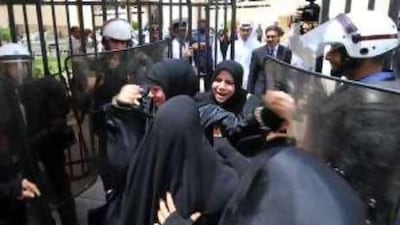MANAMA // A Bahraini criminal court sentenced 11 Shiite protesters to prison terms ranging from one year to seven years for their roles in violent clashes in December that resulted in the burning of a police car and the theft of a machine gun. The sentences come amid rising sectarian tension that both government officials and opposition leaders find alarming. The heaviest sentence yesterday came against Hasan Abdul Nabi, a well-known activist, who was sentenced to seven years and fined 9,985 dinars (Dh98,000).
Four others were sentenced to five years in prison each, including activists Naji Fatel and Maytham al Sheikh; Mohammed al Singace, who heads the Committee to Combat High Prices; and Isa al Serh, a member of the second largest Shiite opposition grouping, the Islamic Action Society (Amal). Six others were sentenced to one year each in prison, while four defendants were found not guilty. Hafiz Ali, a member of the defence team, said his clients planned to appeal the decision.
Angry family members marched outside the courthouse denouncing the decision; one female relative had to be taken to hospital in an ambulance after fainting in front of the building, which was heavily guarded by anti-riot police. The group of 15 was the largest to stand trial to date out of more than 70 detainees rounded up after various clashes that followed the death of a protester at an opposition rally in December.
Police dispersed the march, on the outskirts of the capital, which was held to commemorate what the opposition claimed were martyrs of unrest in the 1980s and 1990s. The protester is believed to have died of natural causes as he tried to flee the police. The first incident occurred in April when a policeman was killed in a clash in Karzakan, a small agricultural village in the north of the island.
Nineteen people are standing trial on charges they took part in the attack on an undercover anti-riot police unit in the village that led to the officer's death. Most of the 70 detainees, about 36 of them, come from the village. In 2000, Sheikh Hamad bin Isa Al Khalifa, Bahrain's king, introduced a package of political, economic and social reforms. The move, which also included the release of political prisoners and the return of political exiles, eased the tension between authorities and the opposition for a time, but disagreements over a new constitution and parliamentary powers rekindled it in 2002.
In May, Sheikh Ali Salman, the head of the largest opposition Shiite parliamentary bloc, who is also secretary general of Al Wefaq Islamic Society, claimed the political reforms had failed. Nevertheless, despite his criticism of the system, Sheikh Salman stood in parliamentary elections in 2006 in what was expected to be a major step forward for the Shiite-led opposition. Sheikh Salman, who was frustrated over his bloc's inability to pass substantive changes through parliament, railed against what he said was continued discrimination towards Shiites. "No one can deny the fact that there is discrimination in Bahrain," he said. "If this continues it would lead the country into a crisis it never experienced before and I fear that the national fabric will collapse."
Over the past four years, the country has experienced outbreaks of violence, mainly in Shiite villages, that have led to clashes with police. Last year, at least 117 protests were organised to demand various labour, housing and human rights, according to a semi-official figure by the ministry of interior. Responding to allegations that the detainees have been mistreated, six key Bahraini opposition parties on June 28 also launched a month-long campaign to reiterate demands that they be released.
The campaign also seeks to bring an end to what its sponsors described as excessive use of force by police when dealing with protests. Maj Gen Abdullatif bin Rashid al Zayani, chief of public security at the ministry of interior, has called the allegations baseless and untrue. In an effort to end the recent round of tension, Sheikh Hamad created a watchdog committee from the ministries of the interior, information and justice and Islamic affairs to keep tabs on preachers, media outlets and websites promoting sectarianism.
Some have accused the new committee, however, of being a front to suppress freedoms. The committee closed down three Bahraini websites that run prominent political forums. At least eight people involved with the websites were summoned by state security and some were charged with instigating hatred. @Email:mmahdi@thenational.ae

